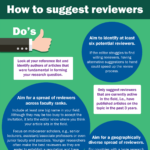Potential referees are typically only given the title and abstract when sent an invitation to peer review an article. It is only upon acceptance of the invitation that they will be given the full paper and supporting materials. It follows, therefore, that your title and abstract are essential to attracting and securing the right reviewers. […]
A reviewer asks for additional experiments – what are your options?
Requests for additional experiments typically fall into one of three categories: The suggested experiments are fundamental to proving your argument. You cannot accept/reject your null hypothesis without these experiments. You have provided sufficient proof for your argument; however, additional experiments would add weight to your conclusions. You have provided ample proof for your argument; the […]
How to suggest reviewers
Journals often struggle to find willing reviewers, which can lengthen the publication process. To combat this, you may be requested to suggest reviewers at the submission stage. In the following infographic, we provide some tips on identifying suitable reviewers. The infographic contains the following text: Do’s Aim to identify at least six potential reviewers. […]
Don’t fall prey to “predatory” journals
What are predatory journals? Predatory journals are profiteering “individuals or companies”, who use the open-access publishing system to exploit authors, by charging them article processing fees without providing the high quality editorial services associated with legitimate journals [1]. How prevalent are they? Predatory journals are on the rise; their publication volumes increased “from 53,000 in […]
Why was my article rejected without being peer-reviewed?
You have worked so hard on your research, and then even harder to write your article. You spent a long time selecting the right journal for your article. Finally, you submit your article, and anxiously await the result of the peer review. So it can be very disappointing if an article is rejected straight away, […]





